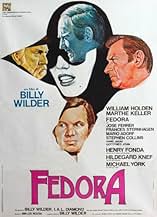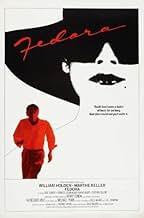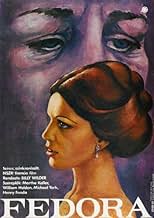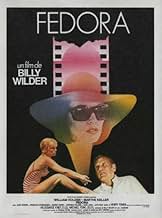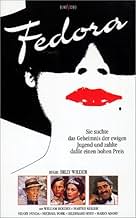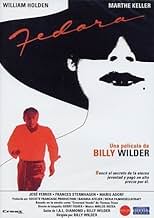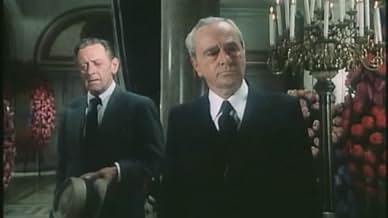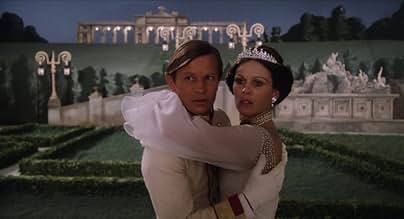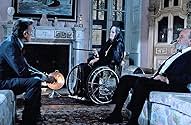Fedora
- 1978
- Tous publics
- 1h 56min
NOTE IMDb
6,8/10
5,7 k
MA NOTE
Le producteur hollywoodien Barry Detweiler tente de sortir Fedora, une actrice de cinéma célèbre mais recluse, hors de sa retraite.Le producteur hollywoodien Barry Detweiler tente de sortir Fedora, une actrice de cinéma célèbre mais recluse, hors de sa retraite.Le producteur hollywoodien Barry Detweiler tente de sortir Fedora, une actrice de cinéma célèbre mais recluse, hors de sa retraite.
- Réalisation
- Scénario
- Casting principal
- Récompenses
- 1 victoire et 1 nomination au total
Robert Cunningham
- Assistant Director
- (as Bob Cunningham)
Avis à la une
The former successful and famous Polish actress Fedora (Marthe Keller) commits suicide at the Mortcerf Station, jumping off in front of a train. The broken Hollywood producer Barry 'Dutch' Detweiler (William Holden) attends the funeral at her house in Paris and recalls that he might have caused her death.
Two weeks ago, Dutch traveled to Greece Island of Corfu seeking Fedora out in the Vila Calypso, located in an isolated island owned by the bitter Countess Sobryanski (Hildegard Knef). Fedora has been living an unsocial reclusive life for the last years in the villa with the countess, the plastic surgeon Doctor Vando (José Ferrer) and her assistant Miss Balfour (Frances Sternhagen), since she abandoned the set of a film that she was shooting in London with Michael York.
Dutch brings the screenplay with a version of "Anna Karenina" to offer to Fedora, with the promise that investors would finance the film if Fedora accepts the lead role. Fedora, who is impressively young, is receptive to the offer, but the countess and the doctor tell that she is mentally unstable and paranoid and can not act again.
When Dutch discovers that Fedora will be secretly sent to a mental institution owned by Dr. Vando in Mortcert, he tries to rescue the actress from the island but he is hit on the head and faints with a concussion. One week later, when he awakes, he learns that Fedora is dead. Dutch travels to Paris and meets Countess Sobryanski that him the truth about Fedora.
"Fedora" is the swan song of Billy Wilder, with an engaging story; a complex screenplay and many twists about aging, selfishness and loss of youth and identity. The plot has many elements of "Sunset Boulevard", with a washed-up producer looking for a former glamorous Hollywood actress that surprisingly has not aged like she should and might represent his comeback to the glory. The secret about Fedora and her friends is unpredictable. My vote is eight.
Title (Brazil): Not Available
Two weeks ago, Dutch traveled to Greece Island of Corfu seeking Fedora out in the Vila Calypso, located in an isolated island owned by the bitter Countess Sobryanski (Hildegard Knef). Fedora has been living an unsocial reclusive life for the last years in the villa with the countess, the plastic surgeon Doctor Vando (José Ferrer) and her assistant Miss Balfour (Frances Sternhagen), since she abandoned the set of a film that she was shooting in London with Michael York.
Dutch brings the screenplay with a version of "Anna Karenina" to offer to Fedora, with the promise that investors would finance the film if Fedora accepts the lead role. Fedora, who is impressively young, is receptive to the offer, but the countess and the doctor tell that she is mentally unstable and paranoid and can not act again.
When Dutch discovers that Fedora will be secretly sent to a mental institution owned by Dr. Vando in Mortcert, he tries to rescue the actress from the island but he is hit on the head and faints with a concussion. One week later, when he awakes, he learns that Fedora is dead. Dutch travels to Paris and meets Countess Sobryanski that him the truth about Fedora.
"Fedora" is the swan song of Billy Wilder, with an engaging story; a complex screenplay and many twists about aging, selfishness and loss of youth and identity. The plot has many elements of "Sunset Boulevard", with a washed-up producer looking for a former glamorous Hollywood actress that surprisingly has not aged like she should and might represent his comeback to the glory. The secret about Fedora and her friends is unpredictable. My vote is eight.
Title (Brazil): Not Available
I devoured Tom Tryon's book and I made my own film in my mind. Needless to say, I loved it. Then I heard that Billy Wilder was going to direct the film version. Perfect, I thought, perfect. I wanted to write to Mr. Wilder to let him know about the film I had already in my mind, not camera shots, naturally, but casting. There was only one actress who could play the Garboesque Fedora in all her mysterious splendor and that was Vanessa Redgrave, then,at that exact moment in time. She was the only actress who could be all the other actresses we've always known and loved rolled into one. That in itself made her unique, spellbinding. Rachel Kempson a great British actress plus Vanessa's mother in real life, to play the old lady. The film was made with Marthe Keller and Hildegarde Kneff in those roles. I hoped for Terence Stamp to be the actor of Fedora's dreams. They chose Michael York. I remember a review by Pauline Kael I believe, when she came to review Michael York in this film her comment was succinct: "Michael York plays himself, unconvincingly". Maybe this is a suitable case for remake. With all due respect to Mr. Wilder, one of my heroes, maybe Cameron Crowe should have a go.
I wish to defend Fedora somewhat from the sole previous IMDB reviewer. It is not a great movie such as "Sunset Boulevard" but it is hugely enjoyable and a real treat for anyone interested in old Hollywood, and the bitter-sweet quality of fading glamour.
Since the death of Marlene Dietrich, and especially with the publication of a biography by her daughter Maria Riva, it is now clear that Fedora is a direct portrait of Ms. Dietrich with much telling accurate detail.
Billy Wilder knew Dietrich and old Hollywood well, and even though made in the 70's, the film captures a genuine essence probably for the last time as figures from the golden age of film have since then moved into retirement and sadly largely slipped the mortal coil.
The real story of the EXTRAORDINARY Ms. Dietrich is better than any of her movies, and Fedora tells some of that story. It makes for more comfortable viewing than Maximillian Schell's documentary "Marlene".
Wilder is an intelligent director, which makes "Fedora" worthwhile viewing. I have always found "Sunset Boulevard" a little too arch and self-consciously aware; "Fedora" is a more lyrical piece by the director as an older man.
Since the death of Marlene Dietrich, and especially with the publication of a biography by her daughter Maria Riva, it is now clear that Fedora is a direct portrait of Ms. Dietrich with much telling accurate detail.
Billy Wilder knew Dietrich and old Hollywood well, and even though made in the 70's, the film captures a genuine essence probably for the last time as figures from the golden age of film have since then moved into retirement and sadly largely slipped the mortal coil.
The real story of the EXTRAORDINARY Ms. Dietrich is better than any of her movies, and Fedora tells some of that story. It makes for more comfortable viewing than Maximillian Schell's documentary "Marlene".
Wilder is an intelligent director, which makes "Fedora" worthwhile viewing. I have always found "Sunset Boulevard" a little too arch and self-consciously aware; "Fedora" is a more lyrical piece by the director as an older man.
Many reasons for see this little gem. the performances, the atmosphere, the crumbs of old Hollywood, the tragedy of glory in passing time. and a touching story. remembering "Sunset Blvd". but being, for its bitter poetry, so different. for me, the basic motif for see it was the presence in cast of William Holden. and this "key" works. for discover not exactly a world but a form of survive. and its precise limits. a film about the traits of past. and meeting with wise use of suggestion, from illustrious names to small details of biographies for transform the film in a form of trip across Hollywood Golden Age.
Billy Wilder is celebrated for a streak of movies that starts with the groundbreaking film-noir "Double Indemnity" and "Lost Weekend" and ends with the comedy classics "Some Like it Hot" and "The Apartment". In between, you have such titles as "Sunset Blvd.", "Stalag 17", Sabrina" and "Witness for the Prosecution", I guess if any movie lover was asked about the 10 greatest movies from the Golden Age, a fistful of Billy Wilder films would be mentioned.
This is just to say that this is the kind of legacy a foreign director, who escaped from the Nazis and never got rid of his German accent, can be damn proud of, he literally owned American cinema and defined many genres. After the sixties, he still had a share of enjoyable movies but they never reached the same iconic status. And when the New Hollywood was built on the ruins of the studio system, Billy Wilder became the incarnation of old school, conventional cinema: big names, big stars and big stories. Wilder's motto was "thou shall not bore the audience" but then came a time where moviegoers, mostly grown-up baby boomers, were enthralled by the spectacle of Bonnie and Clyde's machine-guns, the French Connection' chase, Scorsese's mean streets and the intimacy of the Corleone family. Wilder became the bore, audience-wise.
"Those kids with beards are running things" laments the has-been Larry Detweiller aka "Dutch" played remarkably by William Holden, and his words couldn't have echoed more Billy Wilder's resentment toward the new ways of Hollywood or what was left of it. In the midst of the raging bulls and easy riders' era, the merit of "Fedora" is to provide the interesting insight from a director of the old generation. When the time of Ford, Minnelli or Hitchcock was over, Wilder was still here and made one, deliberately conventional and classic move or movie, so against the current it was meant to fail. But now, after four decades, "Fedora" has aged surprisingly well. It's not a masterpiece but the story is likely to content the movie lovers we are.
In fact, it illustrates this quote from Jean-Luc Godard: "the best way to criticize a film is to make one". And Billy Wilder, adapting the novel 'Crowned Heads', paid a tribute to the Golden Age through the portrayal of Fedora, a star who used to be big but then saw her stardom fade, only to resurrect a few years after. When asked if there was any similarity between "Fedora" and "Sunset Blvd.", Wilder naively said no, but even though it wasn't intentional, one can't have a cinema-themed Billy Wilder's film, featuring William Holden, much more in the narrator's role, and not have "Sunset Blvd." in mind. If anything, the film comes full circle with the classic noir: in the 70's, the Golden Age was the silent era, they didn't need blazing guns and naked breasts, only dialogues and faces.
Fedora was the biggest of her time, mentioning real-life stars and fictional movies as if the film was set in a parallel universe yet close to the reality, just like Norma Desmond interacting with Cecil B. De Mille, as to emphasize the dream-like aura of Hollywood. Then she abruptly ended her career and lived in in remote locations on the Riviera and started to make movies again after a few years of absence, this is where Dutch comes, trying to approach her to star in an adaptation of Anna Karenina, He notices some strange happenings, Fedora seems imprisoned by a group of people as colorful as intimidating: an old Countess with a husky voice (Hildegard Knef), a mysterious plastic surgeon played by Jose Ferrer and a sinister watchdog played by Frances Sternhagen (she was the sheriff's wisecracking wife in "Misery").
The "Sunset Blvd." déjà vu deepens and Dutch' investigation leads to the ultimate revelation about the story of Fedora. And it is intriguing and haunting within its own limitation with a fascinating mix of real actors like Henry Fonda and Michael York, in the intrigue. The main problem with the film is that the peripheral characters actually work better than the central one, Holden is perfect but like many critics pointed out, there had to be an actress of Marlene Dietrich' caliber to play the faded star because the flashbacks don't leave us with the conviction of a Golden Age aura on Fedora. There had to be a Katharine or Audrey Hepburn, Ingrid Bergman, but I guess the film was victim of its era, Wilder didn't have the same touch and only his old buddy William Holden was here to close the loop with "Sunset Blvd.".
But I love the way the film feels like a swan song of the old school and close the curtain on Wilder's five-decade contribution to Cinema, as if he was paying a final tribute to his art. He would later make a film with Lemmon and Matthau, a remake of a French classic farce but the film was of such abysmal quality it was dismissed as part of Wilder's canon, and "Fedora" is a worthy ending to his prolific career. I didn't necessarily enjoy the film, I would say I watched it with mere curiosity, able to appreciate its intent more than its result, but the making of the film is very fascinating, seeing the old Wilder wrestling with the new system to get his film made, along with I.A.L Diamond, is a great lesson of humility and determination.
After knowing the truth about Fedora, which is a self-referential cased of Naked Empress, Dutch says it would make a better story than the one he had in mind; I guess the same goes with the making of 'Fedora',
This is just to say that this is the kind of legacy a foreign director, who escaped from the Nazis and never got rid of his German accent, can be damn proud of, he literally owned American cinema and defined many genres. After the sixties, he still had a share of enjoyable movies but they never reached the same iconic status. And when the New Hollywood was built on the ruins of the studio system, Billy Wilder became the incarnation of old school, conventional cinema: big names, big stars and big stories. Wilder's motto was "thou shall not bore the audience" but then came a time where moviegoers, mostly grown-up baby boomers, were enthralled by the spectacle of Bonnie and Clyde's machine-guns, the French Connection' chase, Scorsese's mean streets and the intimacy of the Corleone family. Wilder became the bore, audience-wise.
"Those kids with beards are running things" laments the has-been Larry Detweiller aka "Dutch" played remarkably by William Holden, and his words couldn't have echoed more Billy Wilder's resentment toward the new ways of Hollywood or what was left of it. In the midst of the raging bulls and easy riders' era, the merit of "Fedora" is to provide the interesting insight from a director of the old generation. When the time of Ford, Minnelli or Hitchcock was over, Wilder was still here and made one, deliberately conventional and classic move or movie, so against the current it was meant to fail. But now, after four decades, "Fedora" has aged surprisingly well. It's not a masterpiece but the story is likely to content the movie lovers we are.
In fact, it illustrates this quote from Jean-Luc Godard: "the best way to criticize a film is to make one". And Billy Wilder, adapting the novel 'Crowned Heads', paid a tribute to the Golden Age through the portrayal of Fedora, a star who used to be big but then saw her stardom fade, only to resurrect a few years after. When asked if there was any similarity between "Fedora" and "Sunset Blvd.", Wilder naively said no, but even though it wasn't intentional, one can't have a cinema-themed Billy Wilder's film, featuring William Holden, much more in the narrator's role, and not have "Sunset Blvd." in mind. If anything, the film comes full circle with the classic noir: in the 70's, the Golden Age was the silent era, they didn't need blazing guns and naked breasts, only dialogues and faces.
Fedora was the biggest of her time, mentioning real-life stars and fictional movies as if the film was set in a parallel universe yet close to the reality, just like Norma Desmond interacting with Cecil B. De Mille, as to emphasize the dream-like aura of Hollywood. Then she abruptly ended her career and lived in in remote locations on the Riviera and started to make movies again after a few years of absence, this is where Dutch comes, trying to approach her to star in an adaptation of Anna Karenina, He notices some strange happenings, Fedora seems imprisoned by a group of people as colorful as intimidating: an old Countess with a husky voice (Hildegard Knef), a mysterious plastic surgeon played by Jose Ferrer and a sinister watchdog played by Frances Sternhagen (she was the sheriff's wisecracking wife in "Misery").
The "Sunset Blvd." déjà vu deepens and Dutch' investigation leads to the ultimate revelation about the story of Fedora. And it is intriguing and haunting within its own limitation with a fascinating mix of real actors like Henry Fonda and Michael York, in the intrigue. The main problem with the film is that the peripheral characters actually work better than the central one, Holden is perfect but like many critics pointed out, there had to be an actress of Marlene Dietrich' caliber to play the faded star because the flashbacks don't leave us with the conviction of a Golden Age aura on Fedora. There had to be a Katharine or Audrey Hepburn, Ingrid Bergman, but I guess the film was victim of its era, Wilder didn't have the same touch and only his old buddy William Holden was here to close the loop with "Sunset Blvd.".
But I love the way the film feels like a swan song of the old school and close the curtain on Wilder's five-decade contribution to Cinema, as if he was paying a final tribute to his art. He would later make a film with Lemmon and Matthau, a remake of a French classic farce but the film was of such abysmal quality it was dismissed as part of Wilder's canon, and "Fedora" is a worthy ending to his prolific career. I didn't necessarily enjoy the film, I would say I watched it with mere curiosity, able to appreciate its intent more than its result, but the making of the film is very fascinating, seeing the old Wilder wrestling with the new system to get his film made, along with I.A.L Diamond, is a great lesson of humility and determination.
After knowing the truth about Fedora, which is a self-referential cased of Naked Empress, Dutch says it would make a better story than the one he had in mind; I guess the same goes with the making of 'Fedora',
Le saviez-vous
- AnecdotesPrior to a preview in Santa Barbara, United Artists had cut twelve minutes from the movie. Director Billy Wilder refused to allow any further cuts, and the screening went poorly, with the audience laughing during the wrong parts of the film.
- GaffesIn the opening scene set in France in 1977, a woman throws herself in the path of a steam train. The last steam locomotives on mainline French railways were withdrawn in 1974, so this could not have happened as shown.
- Citations
The Countess: Remember those days? Moral turpitude? You could have six husbands but you couldn't have an illegitimate child. Now you can have six children and no husband and who cares.
- ConnexionsFeatured in Arbeiten mit Billy Wilder: Ein Gespräch mit Mario Adorf (2014)
Meilleurs choix
Connectez-vous pour évaluer et suivre la liste de favoris afin de recevoir des recommandations personnalisées
- How long is Fedora?Alimenté par Alexa
Détails
- Date de sortie
- Pays d’origine
- Langues
- Aussi connu sous le nom de
- Федора
- Lieux de tournage
- Madouri Island, Lefkada, Grèce(Fedora's private island)
- Sociétés de production
- Voir plus de crédits d'entreprise sur IMDbPro
Box-office
- Budget
- 6 727 000 $US (estimé)
Contribuer à cette page
Suggérer une modification ou ajouter du contenu manquant


